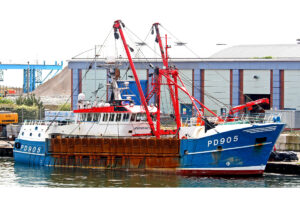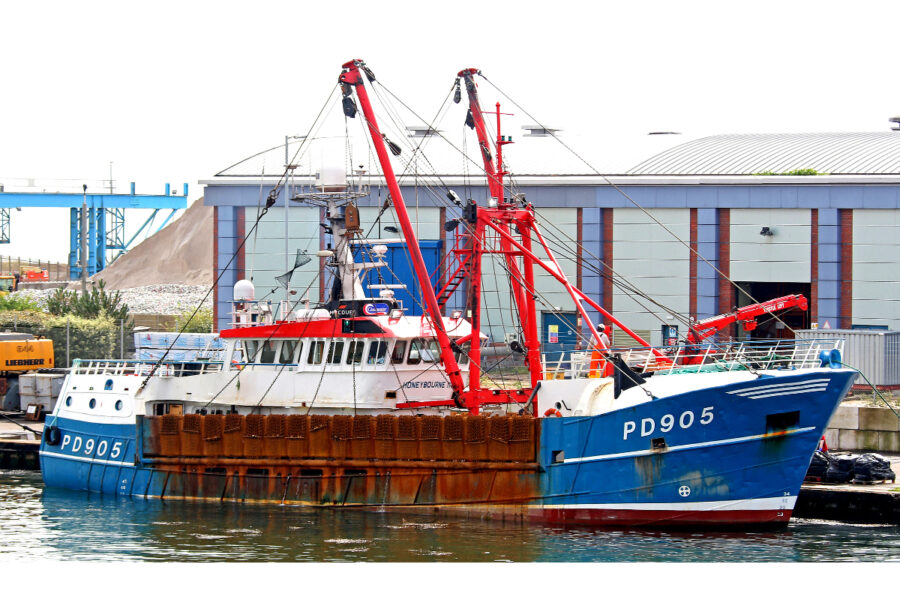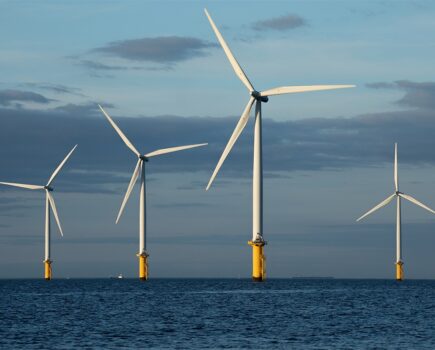Call for navy protection after violence in Channel
British scallop fishermen are calling for naval protection, after seven scallopers were forced to stop fishing and head for home after being attacked with rocks, flares and other improvised weapons by a fleet of about 35 French vessels in the Baie de Seine area, late on Monday night last week, reports Tim Oliver.
The French actions were described as ‘piratical’ and ‘totally unacceptable’ after the British scallopers, fishing legally, were forced to leave the grounds, at least temporarily.
An agreement that is usually reached between the French and UK scallop sectors on fishing in the region was not possible this year, and the French objected to the British scallopers fishing there while they were prevented from doing so by French regulations.
The French took similar action in 2009, before the Baie de Seine agreements began in 2012. A French patrol boat, L’Esteron, was present during the events, but did nothing. The French said they could not intervene because the attacks took place in international waters.

Main Image: Honeybourne III berthed at Shoreham after returning from the Baie de Seine area. (Photo Eddie Mitchell)
The French complain that British scallopers clean out their grounds before they are allowed to fish there from 1 October, and flood the market, pulling down prices. But the French catch 17,000t of scallops in the region during their season, compared to a catch of about 1,000t by the British scallopers.
The action was premeditated, and the French told UK sources six days before the attack that it was being planned. The French boats took a TV crew to sea with them, and were armed with rocks, flares, petrol bombs, lumps of chain, shackles and ropes to foul propellers.
Two vessels, Golden Promise and Joanna C, had windows smashed, and another, Honeybourne III, experienced a minor fire that had to be extinguished.
Industry leaders slammed the French actions, and called for protection by the fishery protection squadron.
Jim Portus, chairman of the Scallop Industry Consultation Group, said: “What the French did was piratical; it was dangerous. They endangered life and damaged property.
“The French behaviour has been appalling. They have overreached themselves. It was one thing to say they were not going to come to an agreement this year, but it’s quite another to take arms against our fishermen going about their lawful business.”
He said he had been in contact with the fisheries minister, senior DEFRA officials and MPs, and was calling for the fishery protection squadron to protect British vessels.
“They should be involved; whether they are in British waters or not, they should look after our boys wherever they are fishing legally, which is what the boats were doing. No one should query the motives of British fishermen going about their lawful business.”
He said the vessels have temporarily left the area, but he believed their intention would be to go back there, ‘as they have every right to do’.
“It’s essential the boats get support from the fishery protection squadron, if and when they go back there. We can’t let fishermen go into danger, knowing the hostility they are facing. Our fisheries minister should get some backbone, go to the MOD, and request protection on the high seas.”
He said that the French prevent their fishermen working there for marketing reasons, and to protect the price of scallops from 1 November, and particularly from 1 December. “Prices go sky-high in France in the Christmas period. They catch 17,000t of scallops in their season, compared to 1,000t harvested by British boats, so there is no way we are causing any damage to their stocks.”
The NFFO also asked the government to intervene over what it said was the ‘outrageous behaviour’ of the French.
“Throwing stones and firing flares is not only dangerous, but illegal under maritime law, and there will be consequences,” said chief executive Barrie Deas.
“The primary concern at the moment is the safety of the crews on both sides, because on the basis of footage that we have seen, the French were carrying out some very dangerous manoeuvres, which could have tragic consequences.
“Only then can the issues of substance, about access rights and management of scallop stocks and sustainable harvesting, be discussed and settled.”
SFF chief executive Bertie Armstrong said: “This is a time for calm, for rational discussion and peaceful resolution, not conflict at sea.
“As control over access and fisheries resources changes in the next few years, it will be imperative that the rules are agreed, accepted and, where necessary, enforced.”
A government spokesperson said: “We are aware of reports of aggression directed towards UK fishing vessels, in an area of the English Channel not under UK control. These vessels were operating in an area they are legally entitled to fish.
“The safety of the UK fleet is our highest priority, and we will continue to monitor the presence and activities of vessels in the area. We are in contact with industry and the French administration, to encourage meaningful dialogue and prevent further incidents from occurring.”
They added, “Incidents should be dealt with by the country in whose waters they occur. We have been in contact with relevant authorities.”
Dimitri Rogoff, president of the Regional Committee of Fisheries of Normandy, called for the standardisation of rules. He said: “We do not want to prevent the English from fishing, we only want to share this cake together. We are neighbours; we have to live together. The state has tabled a project at the European level to create a joint management zone in the Seine Bay, the aim being that the regulation applies in the same way to all countries.”
EU Urged to intervene
Scottish Conservative MEP Nosheena Mobarik has written to EU fisheries commissioner Karmenu Vella, urging him to address what she describes as ‘a shocking degree of aggression’, and to remind the French authorities of their obligations.
Baroness Mobarik, the Conservative fisheries spokesperson in the European parliament, said: “Our fishermen are doing nothing wrong, and the unacceptable scenes we witnessed on Monday night are a risk to both lives and livelihoods. The EU and the French government must act swiftly to prevent a repeat.
“Whatever grievances the French fishermen may have, they can only be resolved around the negotiating table. I look forward to hearing from Commissioner Vella as to what action he intends to take.”
Invitation to talks
Jim Portus said the French had invited him to talks, but he was waiting for them to clarify what they were offering before agreeing.
He said the French would have to ‘climb down’ from their current position on the Baie de Seine, which is that British boats must be excluded from the area for the same period that the French boats are excluded, from 15 May to 1 October.
“The British under-15s don’t get anything from the deal,” he said. “Fishing effort is transferred from France to the UK, to enable our larger vessels to go fishing in other parts of Area 7, including remote scallop fisheries they can’t go to without wasting a lot of time.
“That’s not what they want to do; they want to earn a living, and if the French don’t give us some of their fishing effort, then our boats are perfectly entitled to fish scallop fisheries that are proximate to the UK.”
There has been an agreement between the UK and France for the past five years over the Baie de Seine fishery, but it was not possible to agree a deal this year (Fishing News, 9 August, ‘Baie de Seine/Brittany scallop disappointment as French say ‘Non’).
Barrie Deas said it was likely that the French had Brexit at the backs of their minds. He said the French would need access to British waters ‘on a huge scale’, and it was not clear they would have this after Brexit, when the UK becomes an independent coastal state.
He said the French would try to block the UK from imposing its new rights, ‘so from that point of view I can understand their sensitivity’.
He said that EU fleets, of which a large number were French, fished five or six times as much in UK waters as we do in theirs, so if no Brexit deal was reached on fishing, ‘the losers with absolute certainty would be France’.
But he remained convinced that a deal on fisheries would be reached this autumn between the UK and the EU.
Jim Portus said that if the French action was a sign of what might happen if there were disputes after Brexit, the UK government should use the current action as ‘practice’ for when the UK becomes an independent coastal state.
“As a portent of things to come, it will involve British waters and British resources, and rather than being something we should fear, I think we should look forward to Britain behaving as an independent sovereign state,” he said.
“Quite frankly, at the moment the French fishermen are behaving as if they are an independent sovereign state, which they are not. They are part of the EU and the CFP, and so are we, and their actions are totally unacceptable under the current regime.”
COMMENT
A sign of things to come
Fishermen have always argued – and always will – about fishing rights and access in or near other nation’s waters, or even with other sectors or regions in their own waters. But no argument can possibly justify the atrocious attack carried out by a French armada on the small fleet of British scallopers fishing legally last week in the Baie de Seine off the Normandy coast.
The vessels were fishing completely legally outside of the French 12-mile limit, as they are entitled to do. No matter how aggrieved the French feel about foreign vessels fishing in waters from which they are for the moment banned, to carry out the vicious, dangerous and planned assault they did on the British scallopers is unworthy of a civilised nation. The French fishermen who carried out this violent attack have brought shame on their country and its fishermen.
A French patrol boat present at the scene, that stood by and did nothing, excused itself by saying that the action was outside the French limit and it could not act. This turning a blind eye is disgraceful.
It is essential that when the British vessels return to the area to carry out their lawful business, they have the protection of the British navy to deter any repeat of this appalling attack by the French.
British fishermen have been angered for years by French pair-trawlers hoovering up bass in the Channel, and French vessels having access to the UK six to 12-mile zone in some areas, but have never resorted to this kind of piracy and violence to express their frustration.
The way to resolve disputes of this nature is by talking and negotiation, as has happened successfully in respect of this fishery for the past five years, until this year.
It is highly likely that Brexit, and what it will mean for French fishermen, has played a part in the failure to reach agreement on the Baie de Seine fishery this year.
There is clearly, and understandably, nervousness and apprehension about what the future holds for fisheries in France and other EU countries. With 60% of the catch in UK waters being taken by other EU countries, of which the French catch is a big proportion, they have a lot to lose.
It is extremely worrying if the action seen last week is any indication of the trouble that might lie ahead, when the French and others find themselves either unable to fish freely in areas where they have formerly done so, or unable to catch anything like the amounts they formerly did.
The French of course have form with this kind of behaviour. French fishermen and also farmers have a reputation for resorting to physical violence and disruption to the public if their government displeases them. They blockade ports and cause damage at the drop of a hat, which does not bode well for the post-Brexit era.
It is to be hoped that the British government is geared up and fully prepared to deal with those who flout whatever new fisheries regime emerges after Brexit.








